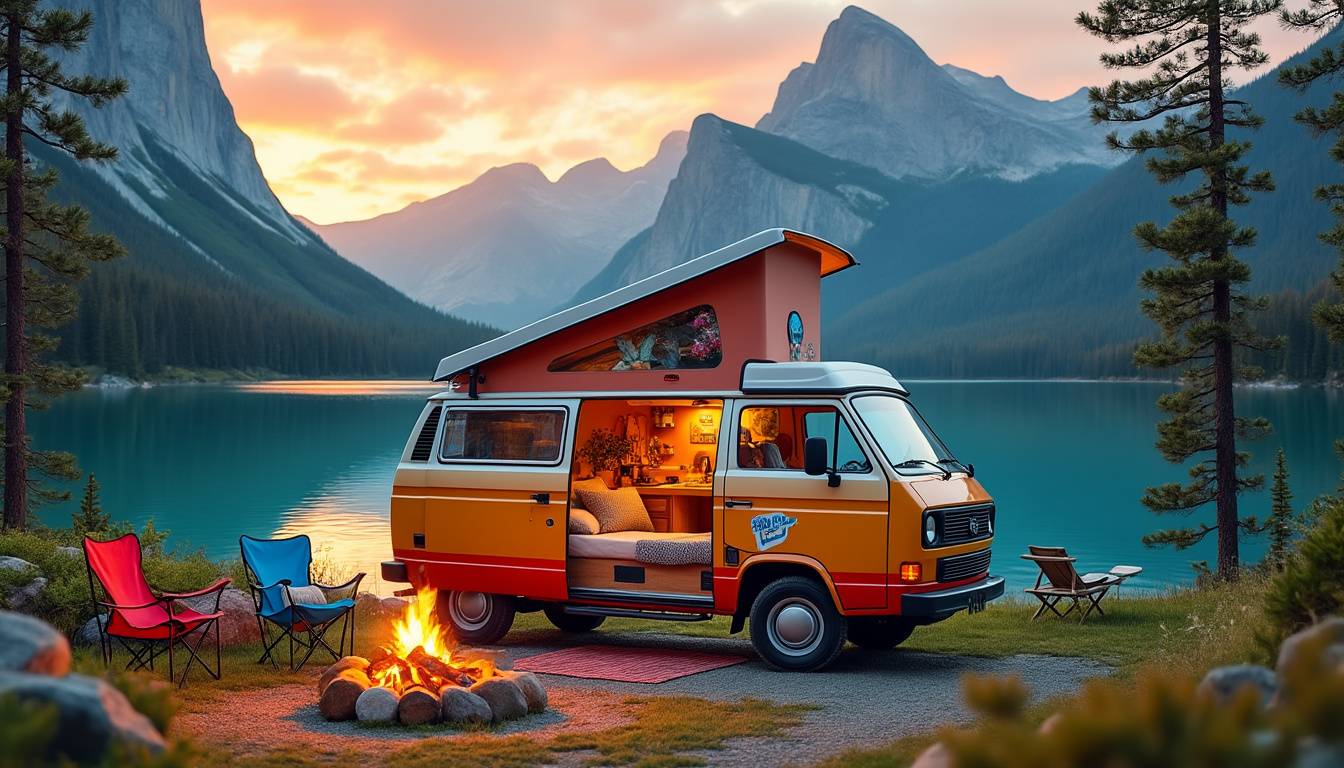Embarking on a vanlife journey has become an emblem of freedom and adventure in today’s fast-paced world. It’s not merely about driving from place to place; it embodies a lifestyle choice that blends exploration, self-sufficiency, and deep connections with the natural world. From historic models like Vanagon to state-of-the-art vehicles like Airstream and Revel, the options for beginning your vanlife are vast and varied. Navigating this landscape, understanding costs, selecting the right vehicle, and preparing mentally and physically are essential first steps. In this guide, we’ll delve deep into everything you need to transform a mobile shelter into a cozy home and hit the open road with confidence and joy.
How to choose the perfect van for vanlife beginners
Choosing your van is the cornerstone of your vanlife experience. The right vehicle supports your travel goals, living needs, and budget. Popular models like the Airstream, Winnebago, Roadtrek, and Sportsmobile offer a blend of comfort, durability, and customization options. Meanwhile, modern adventurers appreciate the versatility of the Thor Motor Coach or the innovative designs of VanX and Revel.
Understanding vehicle types is paramount. From Class B campervans (compact and easy to maneuver) to Class C motorhomes (larger with more living space), each has strengths and compromises. Models like the Campervan North America emphasize eco-friendly upgrades and practical interiors, while classics like the Vanagon evoke nostalgic charm but can require more maintenance.
Key criteria for van selection
- Size and maneuverability: Smaller vans like Roadtrek excel in city driving and parking, while Winnebago provides spacious interiors but demands more careful route planning.
- Fuel efficiency and engine type: Diesel-powered options such as Revel often offer long-range capabilities, whereas gas-powered models may be easier to maintain.
- Build quality and insulation: VanX and Sportsmobile are known for robust builds that withstand diverse climates.
- Customization possibilities: Airstream offers luxury interiors, but sometimes with fewer options to self-design. Conversely, a DIY-focused van like some Thor Motor Coach models can be molded to your tastes.
Evaluating your budget and initial costs
Starting your vanlife involves significant financial considerations. In 2025, the conversion of a vehicle to a fully functional living space ranges widely – approximately from $33,000 for basic setups to over $56,000 for highly equipped, brand new vans including insurance and essential amenities such as beds and kitchen gear.
- Pre-owned vans can reduce initial costs but may require additional maintenance.
- Customization and equipment, such as solar panels or composting toilets, add both comfort and price.
- Insurance varies by vehicle type and coverage but is critical for peace of mind on the road.
| Vehicle Model | Average Cost Range (USD) | Fuel Type | Key Features |
|---|---|---|---|
| Airstream | 50,000 – 70,000 | Gas | Classic design, luxury interiors |
| Winnebago | 40,000 – 80,000 | Diesel/Gas | Spacious, reliable, family-friendly |
| Roadtrek | 60,000 – 90,000 | Gas | Compact, city maneuverability |
| Sportsmobile | 35,000 – 65,000 | Diesel | Off-road capability, customization |
| Thor Motor Coach | 55,000 – 110,000 | Gas/Diesel | Wide range, customizable |
| VanX | 45,000 – 75,000 | Diesel | Robust build, climate ready |
Choosing the right van sets the tone for your entire adventure. Balancing comfort, reliability, and budget will empower you to spend more time exploring and less time worrying about malfunctions or cramped space.
Essential van conversions and equipment for comfortable road living
Converting a van into a cozy, livable space is a fulfilling process, and the foundation for your vanlife lifestyle. Whether you prefer buying a pre-built van or embarking on a DIY conversion, knowing the essential equipment is vital in creating a mobile home that supports comfort, functionality, and independence.
Basic conversion elements every vanlife beginner needs
- Sleeping area: Comfortable beds or foldable options maximize space.
- Kitchen setup: Compact stoves, sinks with water tanks, and portable refrigerators make cooking feasible on the road.
- Storage: Efficient storage solutions keep belongings organized and accessible without clutter.
- Electricity and lighting: Solar panels, under-bed batteries, and LED lighting ensure independence from grid power.
- Insulation and ventilation: Proper insulation maintains cabin temperature; roof vents or fans improve airflow.
Advanced conversions may add composting toilets, showers, and outdoor awnings. Brands like Revel often include these in their off-the-shelf conversions to provide instant readiness for rugged terrain and remote locations.
Top equipment upgrades and their benefits
- Solar power systems: These reduce reliance on campgrounds, enabling sustainability and freedom to camp off-grid.
- Water filtration: Essential for health and hydration, especially in remote areas.
- Heating options: Portable heaters or integrated diesel heating extend your comfort into colder climates.
- Connectivity solutions: Mobile hotspots or signal boosters maintain work and social connections.
| Equipment | Purpose | Average Cost |
|---|---|---|
| Solar panel system | Power independent living | $1,500 – $4,000 |
| Portable stove | Cooking anywhere | $100 – $300 |
| Composting toilet | Waste management | $400 – $1,200 |
| Water filtration system | Safe drinking water | $50 – $600 |
| Portable heater | Temperature control | $300 – $700 |
These decisions will shape your day-to-day experience, ensuring you enjoy the best balance between adventure and comfort throughout your travels.
Planning your routes and securing ideal camping spots for vanlife success
The thrill of vanlife often lies in the open road and unplanned stops, but thoughtful route planning and strategic camping choices dramatically improve your journey. Knowing where to stay safely and comfortably can transform an ordinary trip into a profoundly enjoyable experience.
Steps to effective route planning
- Decide your primary destinations: Whether national parks, coastal drives, or urban explorations, setting intention helps tailor your drives.
- Research camping options: Balancing between public campgrounds, private RV parks, and wild camping spots based on your vehicle’s capabilities.
- Enforce a flexible schedule: Allow spontaneous detours while keeping buffer days for rest or unexpected delays.
- Incorporate weather forecasts: Avoid challenging conditions by monitoring climate patterns ahead of travel.
- Use technology: Apps specifically designed for vanlifers, like Campendium or iOverlander, help discover hidden gems.
Choosing camping spots with respect for nature and communities
The growing vanlife culture reminds us of our responsibility toward the environment and local populations. Vanlifers are increasingly adopting practices such as:
- Leaving sites cleaner than arrival
- Using biodegradable cleaning and hygiene products
- Camping only in designated areas to respect legal and ecological boundaries
These habits preserve the beauty and accessibility of our favorite destinations for future travelers. Brands like Envoy promote eco-conscious journeys by engineering vans and itineraries that minimize carbon footprints.
| Camping type | Pros | Cons | Typical costs |
|---|---|---|---|
| Public campgrounds | Affordable, facilities available, safer | May be crowded, noisy | $10 – $30/night |
| Private RV parks | More amenities, hookups | Higher cost | $30 – $60/night |
| Wild camping (boondocking) | Free, secluded | Limited facilities, legal restrictions | Free or donation-based |
Learning and practicing local camping etiquette is crucial for maintaining positive relationships with host communities and natural reserves alike.
Planning routes with care enriches your experience, ensuring you witness the most breathtaking landscapes, savor diverse cultures, and feel secure throughout your travels.
Managing finances and legal considerations for your vanlife adventure
Financial prudence earns you worry-free travels and legal clarity avoids unwanted interruptions. Both aspects demand attention before and during your vanlife journey. Many vanlifers set budgets inclusive of upfront costs and ongoing expenses like fuel, maintenance, and insurance.
Budgeting essentials to plan your vanlife costs wisely
- Initial investment: Vehicle purchase or conversion, essential equipment acquisition, registration, and insurance.
- Ongoing expenses: Fuel, maintenance, campground fees, food, communications, and occasional repairs.
- Emergency funds: Always maintain a reserve for unexpected breakdowns or health needs.
- Income generation: Many vanlifers work remotely, selling crafts, or engaging with sponsorships as they travel.
Legal requirements and safety regulations
Compliance with local, state, and national laws is non-negotiable and includes:
- Vehicle registration and insurance appropriate to your residency and travel routes.
- Adhering to parking rules and camping restrictions, especially in urban or protected areas.
- Safety measures like smoke detectors, fire extinguishers, and secure storage of propane tanks.
- Respecting wildlife and natural reserve regulations to avoid fines and protect ecosystems.
| Expense type | Estimated Monthly Cost (USD) | Notes |
|---|---|---|
| Fuel | 250 – 600 | Depends on travel frequency and vehicle efficiency |
| Maintenance | 100 – 400 | Routine servicing and minor repairs |
| Camping fees | 50 – 200 | Varies by camping style and location |
| Food | 200 – 400 | Self-cooked meals reduce costs |
| Insurance | 75 – 150 | Critical for legal operation and peace of mind |
By managing your finances with foresight and respecting legal frameworks, you secure the freedom to roam without interruptions or risks.
Embracing the vanlife community: connection, culture, and ongoing learning
Vanlife is much more than a travel mode; it’s a thriving community of explorers who share stories, tips, and a deep respect for adventure. Engaging with this culture enriches your travels and provides invaluable support during challenges.
Making connections on the road and online
- Participate in social media groups and forums dedicated to van conversions and life on the road – platforms dedicated to Vanlife Essential are particularly robust.
- Attend meetups or festivals like those organized by VanX or Sportsmobile enthusiasts, where building friendships is as much the point as sharing vehicle tips.
- Engage with influencers and authors such as Lucile Hétier, whose insights guide many new vanlifers on their journeys.
- Local camping sites and RV parks often facilitate community gatherings that nurture camaraderie.
Ongoing education and resources to deepen your vanlife skills
Never underestimate the power of learning. Books like “Je deviens vanlifer” provide practical and inspiring advice for beginners. Other resources include online tutorials for vehicle maintenance, survival skills, and eco-friendly living techniques. Brands like Campervan North America and Thor Motor Coach sometimes offer workshops that are invaluable for hands-on skills.
| Resource | Type | Focus |
|---|---|---|
| I become vanlifer | Book | Beginner vanlife advice |
| Vanlife Essential | Online guide | Conversion and lifestyle tips |
| The Rolling Home | Social media channel | Vanlife stories and inspiration |
| Campervan North America workshops | Hands-on sessions | Conversion and repair skills |
Being part of the vanlife movement enriches your adventure, turning simple travels into a shared exploration fueled by connection, respect, and continuous growth.
Frequently asked questions about starting your vanlife adventure
- How much does it typically cost to start vanlife?
Starting costs vary but expect to budget between $33,000 and $56,000 for vehicle purchase, conversion, insurance, and equipment. - Which van brands are best suited for beginners?
Brands like Roadtrek, Winnebago, and Airstream provide comfort and reliability suitable for newcomers. - What are must-have features in a van conversion?
A sleeping area, kitchen facilities, storage, and power solutions like solar panels are essential for comfortable living. - Where can I find reliable information and support?
Joining online forums, reading specialized books such as “Je deviens vanlifer,” and attending community meetups can equip you with valuable knowledge. - How do I ensure responsible camping?
Always camp in authorized spots, respect nature, and leave no trace to protect the environment and local communities.


